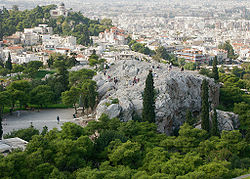- Areopagus
-
- This article concerns the place where a classical judicial body met. It is also the term for the judicial body which met there. For the 16th century literary movement, see Areopagus (poetry). For the regional government during the Greek War of Independence, see Areopagus of Eastern Continental Greece. For the modern Greek Supreme Court, see Court of Cassation (Greece).
 The Areopagus as viewed from the Acropolis.
The Areopagus as viewed from the Acropolis.
The Areopagus or Areios Pagos (Ancient Greek: Ἄρειος Πάγος) is the "Rock of Ares", north-west of the Acropolis, which in classical times functioned as the high Court of Appeal for criminal and civil cases[1] in Athens. Ares was supposed to have been tried here by the gods for the murder of Poseidon's son Alirrothios (a typical example of an aetiological myth).
The origin of its name is not clear. In Greek pagos means big piece of rock. Areios could have come from Ares or from the Erinyes, as on its foot was erected a temple dedicated to the Erinyes where murderers used to find shelter so as not to face the consequences of their actions. Later, the Romans referred to the rocky hill as "Mars Hill", after Mars, the Roman God of War.[2] Near the Areopagus was also constructed the basilica of Dionysius Areopagites.
In pre-classical times (before the 5th century BC), the Areopagus was the council of elders of the city, similar to the Roman Senate. Like the Senate, its membership was restricted to those who had held high public office, in this case that of Archon.[3] In 594 BC, the Areopagus agreed to hand over its functions to Solon for reform. He instituted democratic reforms, reconstituted its membership and returned control to the organization.[4]
In 462 BC, Ephialtes put through reforms which deprived the Areopagus of almost all its functions except that of a murder tribunal in favour of Heliaia.
In The Eumenides of Aeschylus (458 BC), the Areopagus is the site of the trial of Orestes for killing his mother (Clytemnestra) and her lover (Aegisthus).
Phryne, the hetaera from 4th century BC Greece and famed for her beauty, appeared before the Areopagus accused of profaning the Eleusinian mysteries. Legend has it that she let her cloak drop, so impressing the judges with her almost divine form that she was summarily acquitted.
In an unusual development, the Areopagus acquired a new function in the 4th century BC, investigating corruption, although conviction powers remained with the Ecclesia.
 Acropolis of Athens view from Areopagus hill.
Acropolis of Athens view from Areopagus hill.
The Areopagus, like most city-state institutions, continued to function in Roman times, and it was from this location, drawing from the potential significance of the Athenian altar to the Unknown God, that the Apostle Paul is said to have delivered the famous speech, "Now what you worship as something unknown I am going to proclaim to you. The God who made the world and everything in it is the Lord of heaven and earth and does not live in temples built by hands." ( Acts 17:24)
The term "Areopagus" also refers to the judicial body of aristocratic origin that subsequently formed the higher court of modern Greece.
Athens view from Areopagus hill (night). Athens view from Areopagus hill (day).
Athens view from Areopagus hill (day).
See also
Areopagus sermon
Footnotes
External links
- Acts 17:16-34 A Biblical account of St. Paul discussing with the Areopagus the nature of the Christian God. Also referred to is the story concerning the altar to "The Unknown God." See also: Agnostics.
Coordinates: 37°58′20″N 23°43′25″E / 37.97222°N 23.72361°E
Ancient Greece Periods Geography Politics Rulers - Kings of Sparta
- Kings of Athens
- Archons of Athens
- Kings of Macedon
- Kings of Pontus
- Kings of Paionia
- Roman Emperors
- Kings of Kommagene
- Kings of Lydia
- Attalid Kings of Pergamon
- Diadochi
- Kings of Argos
- Tyrants of Syracuse
Life - Agriculture
- Clothing
- Cuisine
- Democracy
- Economy
- Education
- Festivals
- Homosexuality
- Law
- Marriage
- Mourning ritual
- Olympic Games
- Pederasty
- Philosophy
- Prostitution
- Religion
- Slavery
- Warfare
- Wine
Military - Wars
- Army of Macedon
- Antigonid Macedonian army
- Pezhetairoi
- Hoplite
- Seleucid army
- Hellenistic armies
- Phalanx formation
- Peltast
- Sarissa
- Xyston
- Sacred Band of Thebes
People OthersGroups- Playwrights
- Poets
- Philosophers
- Tyrants
- Mythological figures
CulturesBuildings Arts Sciences Language Writing Lists - Cities in Epirus
- Theatres
- Cities
- Place names
Categories:- Ancient Greek geography
- Landmarks in Athens
- Greek courts of appeal
- Ancient Greek archaeological sites in Greece
- Archaeological sites in Greece
- Ares
Wikimedia Foundation. 2010.



